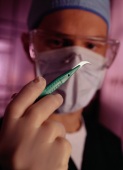- Double Mastectomy May Offer No Survival Benefit to Women With Breast Cancer
- Toxic Lead Found in Cinnamon Product, FDA Says
- Certain Abbott Blood Sugar Monitors May Give Incorrect Readings
- Athletes Can Expect High Ozone, Pollen Counts for Paris Olympics
- Fake Oxycontin Pills Widespread and Potentially Deadly: Report
- Shingles Vaccine Could Lower Dementia Risk
- Your Odds for Accidental Gun Death Rise Greatly in Certain States
- Kids From Poorer Families Less Likely to Survive Cancer
- Tough Workouts Won’t Trigger Cardiac Arrest in Folks With Long QT Syndrome
- At-Home Colon Cancer Test Can Save Lives
‘Doctor, Please Review This Checklist Before My Surgery’


Surgery might be less risky for patients if they have their surgical team follow a safety checklist, according to new research.
The study looked at the use of the World Health Organization’s surgical safety checklist, which was created in 2009 to reduce complications. It outlines 26 tasks that should be undertaken during the three phases of surgery: before anesthesia, before the incision is made and before the patient leaves the operating room.
Specific items on the checklist include reviewing a patient’s allergies before administering anesthesia, confirming the surgical site before cutting and making sure sponges and all other surgical instruments are accounted for before wheeling a patient out of the operating room.
Researchers gave the checklist to 43 patients who had their surgical team sign it to confirm they would follow it. Another group of 61 patients did not know about or receive the checklist.
Surgical teams were more likely to follow all 26 checklist items when operating on patients who had the checklists.
For example, allergies were confirmed in 95 percent of patients in the checklist group and 69 percent of patients without the checklist. The surgical site was confirmed before incision in 74 percent of checklist patients and 54 percent of those without a checklist. And formal counts of sponges and surgical instruments were done in 87 percent of checklist patients and 19 percent of those without a checklist.
All of the patients with a checklist said having it made them feel more comfortable before their surgery, according to the study, which is scheduled for presentation at a meeting of the American Society of Anesthesiologists being held in Dallas from Jan. 24 to 26.
“The checklist is only beneficial when it is used, and we found that involving patients helps ensure that surgical teams complied with it,” Dr. Seth Christian, director of quality for the department of anesthesiology at the Tulane University Hospital and Clinic in New Orleans, said in a society news release.
“Empowering patients to participate in their own care creates a culture of safety and makes them feel safer — and rightly so,” Christian said.
More information
Here’s where you can learn more about the WHO’s surgical safety checklist.
Source: HealthDay
Copyright © 2024 HealthDay. All rights reserved.










